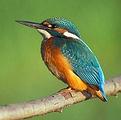 根據衛星圖像顯示,巴布亞新幾內亞洲(Papua New Guinea)的新不列顛群島(New Britain)第一次發現大規模的森林砍伐,使得許多種鳥類面臨比以前更嚴重的絕種威脅,在這些島上棲息著許多地球上其他地方找不到的稀有鳥類。
根據衛星圖像顯示,巴布亞新幾內亞洲(Papua New Guinea)的新不列顛群島(New Britain)第一次發現大規模的森林砍伐,使得許多種鳥類面臨比以前更嚴重的絕種威脅,在這些島上棲息著許多地球上其他地方找不到的稀有鳥類。
因為全球對棕櫚油的需求快速且無節制地擴張,在1989年到2000年之間,島上的森林低地消失了約8分之1。
國際鳥盟(BirdLife International)全球物種計畫負責人布查特(Stuart Butchart)表示,這個發現顯示著新不列顛群島的特有鳥類因為我們在食品及工業上對棕櫚油的廣泛使用及渴求,而即將走向滅絕。
他進一步指出,在馬來西亞和印尼的森林低地都消失了之後,許多公司現在都將目標轉向東方,如新幾內亞和美拉尼西亞等,使當地的新物種面臨威脅。
Many more bird species are threatened with extinction than previously feared, according to analyses of satellite images that reveal for the first time the extent of deforestation occurring on the island of New Britain, Papua New Guinea. The island is a stronghold for a number of birds found nowhere else on Earth.
An eighth of lowland forest on the island disappeared between 1989 and 2000, driven by a rapid and uncontrolled expansion in global demand for palm oil.
"The findings show that New Britain's endemic birds are being driven to extinction by our thirst for palm oil, which is widely used in foodstuffs and industry," said Stuart Butchart, BirdLife International's Global Species Program coordinator.
"After wiping out the lowland forests of Malaysia and Indonesia, companies are now moving eastwards, to New Guinea and Melanesia, where they now threaten a whole new suite of species," he said.
全文及圖片詳見:ENS





